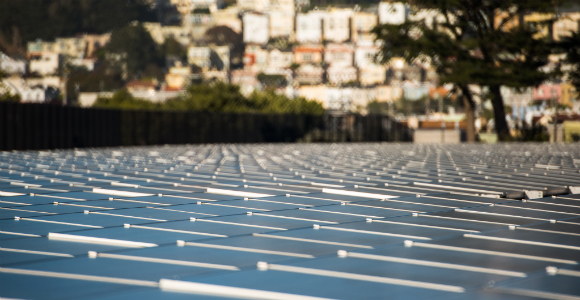
Solar array in San Francisco. (Photo Credit: Daniel Hoherd/Flickr)
From Riverside to Silicon Valley to San Diego, clean economy businesses are hiring local workers, growing California’s economy, and reducing our carbon footprint all at once. Often they’re doing it despite cumbersome regulations that were designed for the fossil fuel economy of the twentieth century.
A new study by the Global Commission on the Economy and Climate clearly states that transitioning to a clean economy – with all the accompanying climate, security and health benefits – will be cheaper than continuing to invest in the fossil fuel economy. By modernizing regulations and cutting red tape, local, state, and federal governments can stimulate the clean economy at little to no cost.
In California, we’ve started doing just that.
Solar companies have to hopscotch a byzantine web of municipal regulations across California’s cities to install solar on a homeowner’s roofs. This bureaucracy adds an extra $700 to $1,100 to the cost of a residential solar system and, in some jurisdictions, over three months of waiting time. This year, the solar industry joined with Assembly member Al Muratsuchi (D-Torrance) and Governor Jerry Brown to pass a bill that will significantly reduce that regulatory burden. By standardizing the solar permitting process statewide, this law has cut red tape at no state expense and enabled Californians to more quickly and easily start saving money and generating their own clean power.
In the Inland Empire, where air conditioners blast nearly year-round, the high cost of credit once prevented people from improving their homes in ways that would dramatically lower their energy bills. In recent years, local governments have enabled homeowners to make these improvements using an innovative program called Property Assessed Clean Energy (PACE). Through PACE, a homeowner can finance efficient roofing, windows, air conditioners, and other technologies with private low-interest loans repaid through an additional charge on their property taxes. In California, PACE has financed over $300 million in improvements, created over 2,350 jobs, and reduced carbon emissions by half a million tons. While these programs are enabled by local governments, they cost the taxpayers nothing.
In 2009, the Bureau of Land Management (BLM) had 223 pending applications for renewable energy projects on public land, only two of which had made it through the review process. So the BLM and the State of California joined together to fast track the review of these projects on designated land. Since then, enough solar, wind, and geothermal projects have been approved through this process to power up to 5.7 million homes with clean, safe, and local energy. If the federal and state government had not aligned their bureaucracy with their priorities, these projects would still be stuck in bureaucratic purgatory. This fast-track review process cost the government almost nothing.
Modernizing our out-of-date regulations is essential to the success of the clean economy, but it is anything but glamorous. In the coming years, Sacramento could boost clean transportation by creating a system to fast-track permits for electric vehicle charging stations on parking lots or alternative fuel pumps at gas stations, at little to no public cost. Paving the way for a cleaner transportation system will reduce costs for consumers and reduce the 37 percent of California’s carbon emissions that come from transportation.
In the clean economy, as in the rest of the economy, a dollar saved is a dollar earned. Our elected leaders can create a cleaner, more prosperous future for Californians by modernizing costly obstacles and prioritizing projects that create jobs and decrease pollution. Every public official from school board member on up can have a hand in growing the clean economy and creating healthier communities across California, without spending a dime of taxpayer money.
Nicholas Josefowitz is the Chief Executive of RenGen Energy and founder of Leadership for a Clean Economy. Rachel Van Wert is the political director of Leadership for a Clean Economy.

